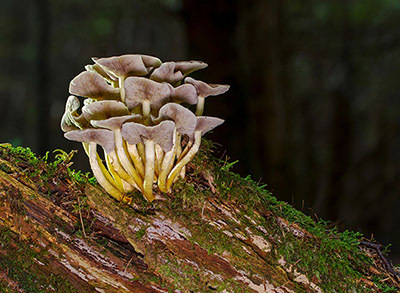On sluts and slatterns
Here is another attack on sl-words, a continuation of the one celebrated last week (“The sl-morass”). There, I mentioned the fact that a word beginning with sl– tends to develop negative connotations. My example was Engl. slim, as opposed to German schlimm “bad.” Another example (one of many!) is slight. In the Old Germanic languages, including Gothic, which was recorded in the fourth century, the word meant “smooth,” perhaps “slippery.” (Incidentally, to slip is also a verb of questionable antecedents, and one can easily slip on a slope; slope, we are told, is a word of unknown origin). Engl. slight retained its ancient meaning “smooth” in some dialects. Elsewhere, it means “small; insignificant,” but in German, schlecht yielded the senses “simple” and “bad.” Allegedly, under the influence of Dutch or Low [= northern] German the English verb to slight began to mean “to disdain, disparage.” Conclusion: beware of sl! You will end up neck-deep in slime (slush) or among sleazy individuals, to say nothing of sluts and slatterns.
Slattern turned up in texts only in the seventeenth century, but it seems to have been known long before the time of its first attestation, approximately when slut turned up. At first, both meant “a slovenly woman.” Slut deteriorated, like many other words for “an untidy female,” that is, from “draggletail” to “whore.” The literature on both words is rather extensive, and it is usually taken for granted that they are in some way cognate. Only Walter W. Skeat insisted that they were either unrelated or derived from different forms of the same verb.
At least as early as the 1870s, Engl. slattern and slut, along with their German and Dutch look-alikes, were traced to Celtic. This is an unpromising hypothesis, because the origin of the Celtic words is unknown and the circumstances under which they supposedly reached such broad areas have never been revealed. Quite a few English sl-words are of Scandinavian origin, and the Norse etymology of both slut and slattern appear in several dictionaries; it has a modern supporter, namely Dr. William Sayers. However, almost identical words were widely known in Germany (see below), where the influence from Scandinavian speakers cannot be considered.
 Look at this picture and the other two pictures posted below: they feature similar-looking but unrelated “entities.” Image credit: Mushroom by adege. Pixabay License via Bali Indonesia Children by Nico_Boersen. Pixabay License via Pixabay.
Look at this picture and the other two pictures posted below: they feature similar-looking but unrelated “entities.” Image credit: Mushroom by adege. Pixabay License via Bali Indonesia Children by Nico_Boersen. Pixabay License via Pixabay.In this context, I cannot refrain from citing Russian shliukha “slovenly woman; prostitute.” This word is usually connected with a verb meaning “to gad about,” but is it not a member of the slut-schluite club? Didn’t some such words travel all over Europe? Those interested in analogous cases may consult the entries trull and traipse in my etymological dictionary. (I did not check the existence of schluite and know only German schlutte and schlotte, but in my experience, Mackay’s material, unlike his erratic hypotheses, is always reliable.)
The main facts that throw light on the history of slut come from Italy. Following the suggestion of the distinguished Romance scholar Ernst Gamillscheg, Vittoria Grazi collected a list of German and Italian regional nouns, adjectives, and verbs of the type that interests us. I’ll cite only a few Italian forms, obviously borrowed from German dialects. Their semantic range goes all the way from “prostitute” and “dirty” to “suicide”: sludre, slodra, sloter, slöder, and others beginning with sl-. It seems reasonable to suggest that such words were coined in the German-speaking area. They could not come to Italy from Scandinavia or Ireland, but from Germany they seem to have spread in several directions, flooded Dutch, and reached England. In English they are not native. Yet their origin is obscure. Some of them may be onomatopoeic and sound symbolic. The group sl– seems to imply the idea of filth in many parts of the Eurasian world.
 RCMP Boots by Nic Amaya. Public domain via Unsplash.
RCMP Boots by Nic Amaya. Public domain via Unsplash.It is probably unpractical to look for the exact form that gave rise to slut and slattern. The Oxford Dictionary of English Etymology took its cue from the OED and wrote (at slut): “Of unknown origin; contact with continental words similarly used and having the same cons[onant] structure sl..t. cannot be proved.” But how can anything be “proved” here? What arguments would be decisive to show the connection? Those words are related in the same vague way in which all such formations are. Therefore, the researchers who lumped them together were probably right. Sl-nouns, adjectives, and verbs rarely disclose their past. Look up sloven “rascal,” which we remember only thanks to slovenly, and you will read that this sixteenth-century word is perhaps based on Flemish sloef “dirty, squalid,” Dutch slof “negligent.” And so it goes. Dirty business indeed.
Image credit: Skating by LuigiTa7. Pixabay License via Pixabay.
The post On sluts and slatterns appeared first on OUPblog.

Oxford University Press's Blog
- Oxford University Press's profile
- 238 followers



